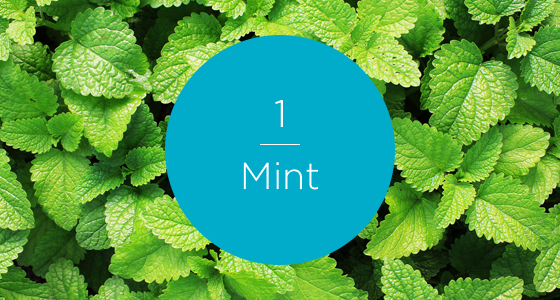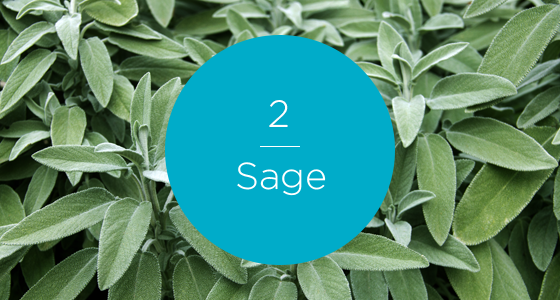Fresh herbs are good for your overall health, are easy to grow and thrive indoors year-round. Besides great flavor, herbs can also have surprisingly positive effects on your oral health. Plus, growing plants just feels good. See how you can benefit from growing these three herbs.
Growing green herbs for a whiter smile
The mint family includes dozens of species of plants, including peppermint, spearmint and even catnip (Careful planting that last one outside). Mint is rich in nutrients — like vitamin A — and known for multiple health benefits, such as relieving indigestion and promoting good eye health.
There’s a reason most dental care products are flavored with mint. Mint is good for your oral health. Chewing on fresh mint leaves may temporarily relieve bad breath. And, mint’s crisp mouth feel makes a passable substitute if you’re trying to cut down on cavity-causing sugar.
You can add fresh or dried mint to many foods and beverages. Use it as an ingredient in teas (read on for a deceptively-tasty recipe) and smoothies, infuse water with mint and cucumber for DIY spa-water or even sprinkle it on green salads or fresh fruit. Its flavor pairs well with savory foods too. Try it with lamb, or even fried eggs.
Another member of the mint family, sage is strong and savory. It contains several nutrients, including vitamin A, magnesium and potassium. Sage also contains vitamin K, which is known for having an important role in bone health and blood clotting.
Sage is loaded with antioxidants that may help protect cells from diseases, including oral diseases. Research shows that antioxidants may play a role in wound healing and prevention of gum disease and inflammation.
There are many easy ways to add sage to your diet — garnishing soups, chopping the leaves into butter or mixing it with eggs in an omelet. For an easy tortellini or ravioli sauce, drop fresh sage leaves in a pan with a little melted butter. Gently brown the butter, add the cooked tortellini or ravioli, give it a toss and serve with grated parmesan cheese. Sage and thyme can add flavor to roasted chicken, breads and other baked goods.
Another part of the mint family (noticing a pattern yet?), rosemary contains antioxidants and anti-inflammatory compounds that may help boost the immune system and improve blood circulation.
Rosemary contains calcium, known for promoting good oral and bone health. Calcium is an essential mineral for your smile, as it strengthens enamel, helps prevent tooth decay and can even repair places where acids have damaged teeth.
Whether fresh or dry, rosemary is often used in chicken, lamb and egg dishes — or added to tea. For a wonderful and fast chicken marinade, mix lemon juice, olive oil, smashed garlic, ground pepper, salt and a few sprigs of rosemary. Take care when adding rosemary to sauces, though. Its strong, vibrant flavor can overpower more subtle ingredients.
Keep your oral health in mind while gardening
Not only can you reap the oral health benefits of the herbs you grow, but outdoors gardening is also good for physical and mental health. That said, nothing ruins a day gardening like an injury. Make sure to protect your oral health while gardening:
• Wear a wide-brimmed hat and use sunscreen with an SPF 30 or higher to protect yourself. Make sure to use a lip balm with a high SPF. After all, lip balm tastes better than sunscreen and hurts less than sunburned lips.
• Stay hydrated with water to avoid both heat exhaustion and dry mouth. If you’re sweating excessively, go ahead and up your electrolyte intake.
• Prevent accidents, including face and dental injuries, by using extra caution with power tools. Try not to use your teeth to aid in tasks like tying knots or clipping string.
• Wear gloves to protect your hands. Also, try not to touch your face until you’ve washed your hands. Compost, dirt, bacteria and fungi (and everything that lives in both) should stay on the ground, not in your mouth.
Brew mouth-friendly herb tea
Looking for another reason to exercise that green thumb? Try this herb tea made from mint, sage and rosemary. Whether you sip it hot or cold, this tea is good for your smile. Experiment with fresh herbs for even more flavor!
Ingredients:
6 tablespoons dried mint
1 tablespoon dried sage leaves
1 tablespoon dried rosemary
1 tablespoon dried thyme
1 cup water
Directions:
1. Combine herbs and store in an airtight container.
2. When you’re ready to drink, add 1 ½ teaspoons of tea mix to a glass.
3. Crush or muddle until aromas are released.
4. Add 1 cup of boiling water.
5. Cover and steep for 10 minutes.
6. Strain tea into your favorite mug.
7. Blow to cool.
Can marijuana affect my teeth?
Here's some food for thought.
Ready for something healthy AND cheesy?
Try this delicious summer squash recipe.
Spending the summer indoors or outdoors?
Here are 10 ideas for enjoying the season.












